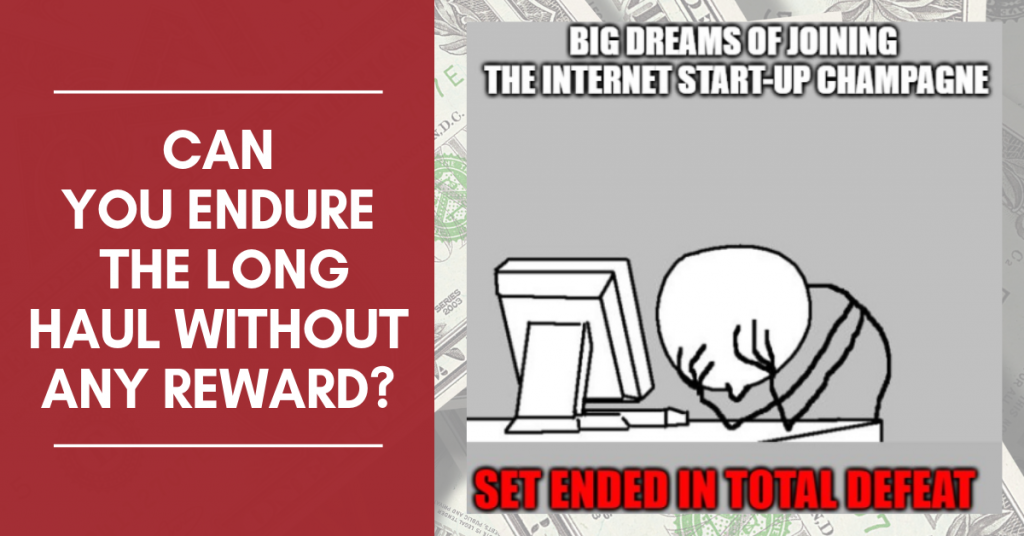One of Thousands Who Followed the Herd to Big Losses in the Dot Com Era

The worst investment experience in my life was during the Dot Com period of the late 1990s, when almost everyone was a fanatic about the “Internet magic”. I was no exception. Many friends around me were talking about the idea of start-ups and later selling the “company” to some big guys on The Street, such as Yahoo or whoever, and making billions from this Internet dream.
Dream of joining the Net champagne set ends in defeat
I lost every penny that I invested. Although it was not the end of the world, a great deal of money had gone to my Dot Com dreams. The good part was that I still had my day job to survive, but the bad part was that I had to set aside my visions of caviar, yachts, and champagne. I had to return to basics and work my butt off for a living.
If you’re not among the smartest, don’t invest in a craze
Before you make an investment in a start-up, you must ask yourself some serious questions. Are you smarter and luckier than Joseph Tsai (Jack Ma’s legendary partner)? If not, you should not follow a fad. If you are not an expert in the target industry or business type, you will most likely be the last investor to get on any particular bandwagon.
You know about the target company and its industry?
Just say no to unfamiliar investments or business plans. Do not invest in a business you do not know or about which you have little knowledge. Often, your “good” friends will put some “good” investment opportunities in front of you and you will be too kind to refuse. Be tough on each investment, treating each outlay as a completely separate venture, looking at all conditions, every time, because this is your money!
Don’t walk into a casino if you’re not willing to lose it all
Question the suitability of the investment to your risk appetite. Ask yourself: “Can the entire investment evaporate without putting a dent in my life? Most of all, don’t act as an angel investor in a company’s early stages unless you have more than US$100 million free cash to throw away and you love to help young people to be successful.
Be ready to endure the long haul without reward
Look at the long-time horizon and ask yourself if you can survive without any returns for a long time. Otherwise, don’t act like a private equity investor, because it can take more than five to 10 years to have sufficient returns to exit, and that’s if you’re lucky.
Andrew’s takeaways – Avoid these errors to become a better investor
Dreams can be very expensive investments
Throughout our lives we will be approached by people with exciting dreams of business success. My blanket advice is: DON’T INVEST. Investing in start-ups is such a high-risk endeavor; the odds are you will never see your money again. It is an extremely rare case that you get your money back.
Diversification is key, but you probably can’t afford it
The best way to handle this type of high-risk investment in a start-up is to diversify. If you have $10 million, put $1 million in 10 different start-ups. If you have $100 million put $1 million in 100 different start-ups. This is a suitable level of diversification when it comes to start-ups. The problem is most people don’t have this kind of money to invest. So, they shouldn’t be doing it.
Most people just wish they were angels
A common angel investment story is that someone makes good money in an investment and feels overconfident and decides to become an “angel” investor (Definition: A person who sprinkles money on a start-up like an angel from heaven). The angel picks out a company that they like, and they put a bit of money into it. Within months, that start-up is gasping for money and the investor will have little choice but to add more. Most people won’t walk away from the money they have already put in (and lost) and, as a result, they put more money in and eventually lose it all. You will hear a loud thump as this angel falls to earth. However, I cannot deny that there are lucky ones; if you are one of those, please disregard this paragraph.
Mistakes in this story
1. Failed to do their own research
- Inadequately researched type of investment
2. Failed to properly assess and manage risk
- Failed to match investments with risk appetite
3. Driven by emotion or flawed thinking trust
- Let emotions drive their investment decisions
- Was driven by FOMO
6. Invested in a start-up company
- Invested in a start-up that lacked a clear business plan

